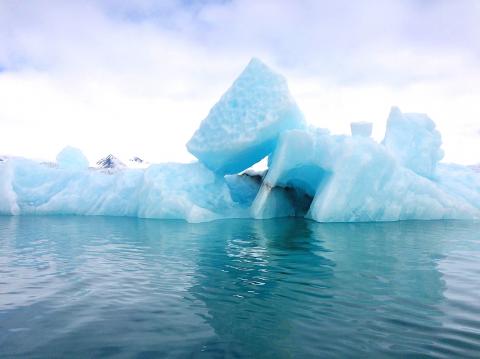Just before visual artist Shih Yun-yu (施昀佑) embarked on his trip to Svalbard, an archipelago some 640km north of Norway, someone broke into his car and stole all his photography equipment and hard drives.
Since the two-week journey was part of an Arctic Circle artist residency, he couldn’t delay his trip. All he had was his cell phone and some audio recording equipment loaned to him by another artist.
After arriving, Shih looked into local the history.

Photo courtesy of Shih Yun-yu
“A major theme of Arctic stories is failure,” he says, referring to the harsh conditions and the many disastrous European expeditions to the area. “There aren’t many things you can control, and often what you hope for doesn’t happen. That’s kind of like what I experienced.”
Shih said everything worked out for the better, and he completely discarded his usual medium and went with sound.
“The environment there is too stunning, almost overwhelming,” he says. “What artists can add to such a visual image is very limited, so I didn’t even bother borrowing a camera.”
Based in New York, Shih is visiting Taiwan and has planned a 60-minute pure sound performance based on his trip titled Echo from the Perpetual Day (永晝回聲) Sunday afternoon at Insomnia Cafe (睡不著咖啡).
North pole noise
The performance includes audio Shih recorded in the Arctic — of glaciers calving, water flowing, the rhythmic drip of melting ice, eerie bird and seal calls along with travel commercials for the North Pole.
There’s also a spoken word part in Chinese which takes up about 20 minutes of the performance, on Swedish explorer S A Andree’s 1897 attempt to cross the North Pole from Svalbard to either Russia or Canada in a hot air balloon. The balloon crashed on an island just two days after departure and the crew died as winter descended. The group’s fate remained a mystery until its final camp was found in 1930 where Andree’s diary was retrieved.
“It’s interesting that [Andree] and I pretty much saw the same things,” Shih says. “Yet, I didn’t have the fear he had. I felt the unfriendliness of nature, but I didn’t experience it like he did. But my notions of safety were overturned.”
Shih kept this idea that the Arctic isn’t a welcoming place in his mind when he collected his sound samples.
“Some sounds can make you feel uncomfortable,” he says. “I wanted to use some of these as material to describe the violence of nature … and show the relationship between nature and humans, but not in a romanticized ‘humans are so insignificant way.’”
Shih also includes some pleasant sounds such as breaking waves. “I’m not trying to drive the audience crazy,” he says.
Shih later translated Andree’s diary into Chinese. His friend Henry Lee (李仁豪) will read parts of the diary during the performance. In the past, Lee has portrayed Chinese Opera figure Lin Chong (林沖), who leaves his prestigious post to become an outlaw. Lee is also a marathon runner. Shih says these two qualities of failure and pushing one’s limits would make Lee an ideal narrator.
Shih says the audio project is part of a book he is working on of both personal and informative essays based on his Arctic experience, notes he took and letters he wrote, his research on Andree and a timesheet of all the glacial calving he heard during the entire trip. He plans to publish it in both Chinese and English.

In the March 9 edition of the Taipei Times a piece by Ninon Godefroy ran with the headine “The quiet, gentle rhythm of Taiwan.” It started with the line “Taiwan is a small, humble place. There is no Eiffel Tower, no pyramids — no singular attraction that draws the world’s attention.” I laughed out loud at that. This was out of no disrespect for the author or the piece, which made some interesting analogies and good points about how both Din Tai Fung’s and Taiwan Semiconductor Manufacturing Co’s (TSMC, 台積電) meticulous attention to detail and quality are not quite up to

April 21 to April 27 Hsieh Er’s (謝娥) political fortunes were rising fast after she got out of jail and joined the Chinese Nationalist Party (KMT) in December 1945. Not only did she hold key positions in various committees, she was elected the only woman on the Taipei City Council and headed to Nanjing in 1946 as the sole Taiwanese female representative to the National Constituent Assembly. With the support of first lady Soong May-ling (宋美齡), she started the Taipei Women’s Association and Taiwan Provincial Women’s Association, where she

Chinese Nationalist Party (KMT) Chairman Eric Chu (朱立倫) hatched a bold plan to charge forward and seize the initiative when he held a protest in front of the Taipei City Prosecutors’ Office. Though risky, because illegal, its success would help tackle at least six problems facing both himself and the KMT. What he did not see coming was Taipei Mayor Chiang Wan-an (將萬安) tripping him up out of the gate. In spite of Chu being the most consequential and successful KMT chairman since the early 2010s — arguably saving the party from financial ruin and restoring its electoral viability —

It is one of the more remarkable facts of Taiwan history that it was never occupied or claimed by any of the numerous kingdoms of southern China — Han or otherwise — that lay just across the water from it. None of their brilliant ministers ever discovered that Taiwan was a “core interest” of the state whose annexation was “inevitable.” As Paul Kua notes in an excellent monograph laying out how the Portuguese gave Taiwan the name “Formosa,” the first Europeans to express an interest in occupying Taiwan were the Spanish. Tonio Andrade in his seminal work, How Taiwan Became Chinese,